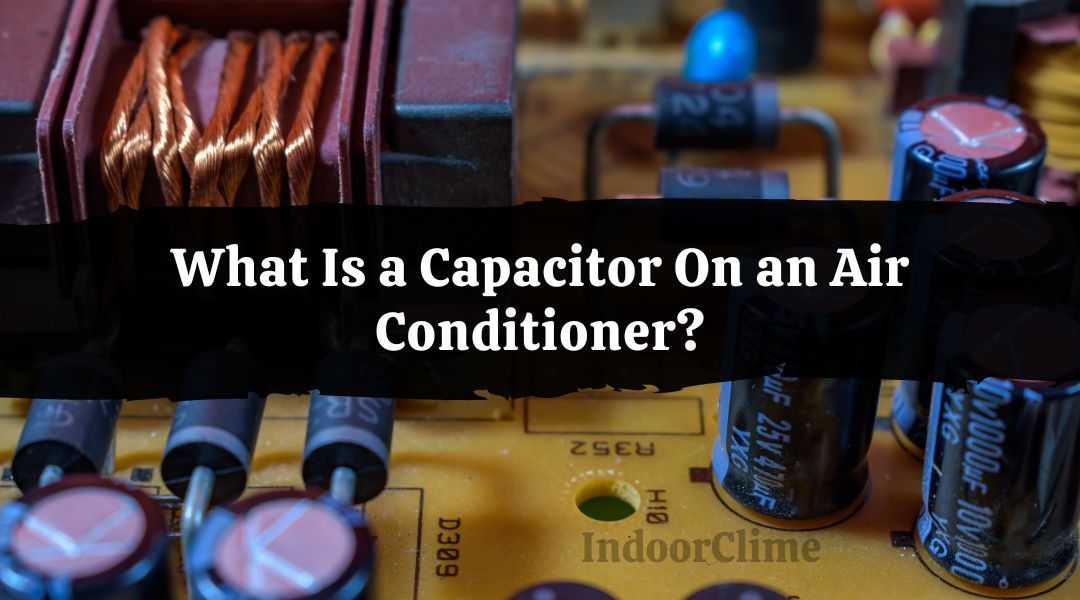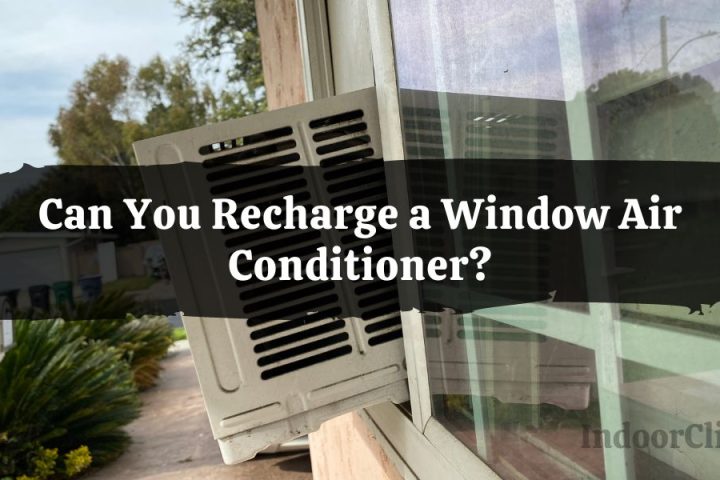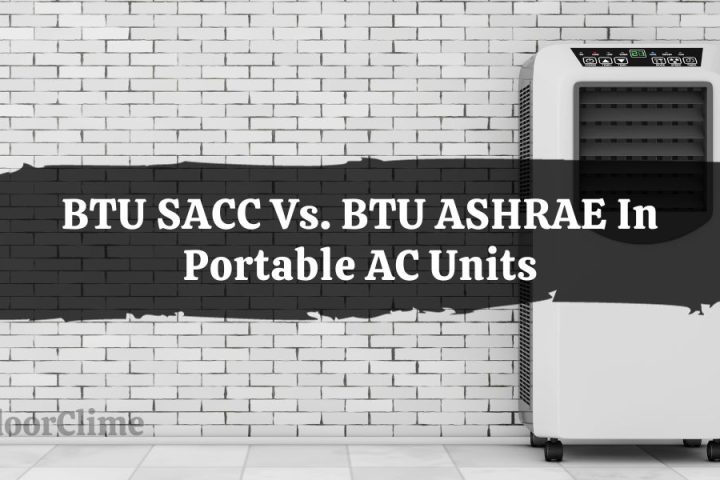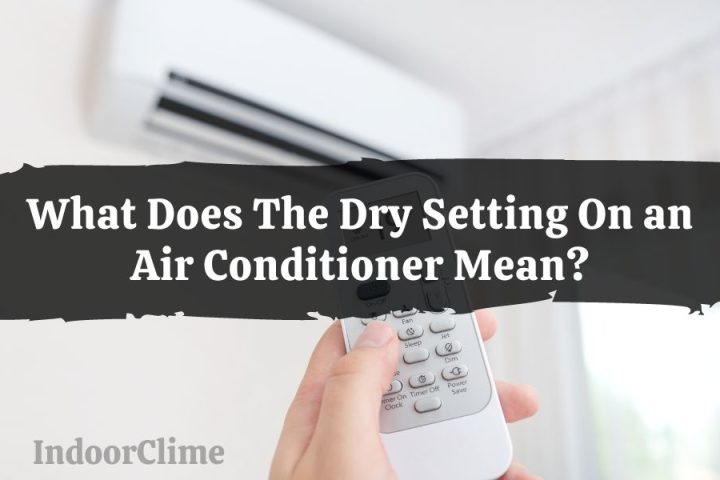You can find one of the most critical components of your complete HVAC system among the jumbled mess of wires within your air conditioner’s outside unit: the Air Conditioner Capacitor.
Your AC capacitor, which looks like a shiny, cylinder-shaped battery, is in charge of energizing the motors in your AC system so they can start working when it’s time to cool things down in your home.
Continue reading to learn and identify everything you need to know about AC capacitors, including recognizing early signs of danger and what to do if yours fails.
The Air Conditioner Capacitor initiates and maintains the operation of the numerous air conditioner motors by accumulating a store of electricity that may be used to provide continuous power.
It is a temporary battery in this capacity, ensuring a steady energy flow to keep the system functioning correctly.
What Is a Capacitor On an Air Conditioner?
The AC unit capacitor is an electrical component that stores charge in an electrostatic field inside your unit. In a nutshell, it’s a power storage device for the short term. The air conditioner capacitor sustains voltage and starts the cooling system’s motors.
The air conditioner’s capacitor drives the air conditioner’s motors. Thus it’s also required for it to work.
In addition, air conditioners often include three engines, all caused by the capacitor. As a result, if the capacitor isn’t working correctly, your air conditioner will either not work or operate inefficiently.
In summary, the failure of your air conditioning capacitor could mean your air conditioning system’s slow and gradual demise.
What Does an AC Capacitor Do?

In function, an AC capacitor is comparable to a battery, yet they operate in entirely different ways. The capacitor’s role is to absorb and store electrical energy that can be used to start and maintain the fan motors.
It allows the air conditioner to work reliably and efficiently for extended periods. In addition, they support maintaining a consistent charge on the engines.
The AC unit capacitor is one of the most often replaced elements of an air conditioner since if it fails or malfunctions; it can shut down your entire HVAC system.
If this happens, your air conditioner will have to work harder to circulate cool air in your space, which could cause your AC unit to break down or result in higher energy bills.
An AC capacitor provides the initial jolt of power your air conditioner’s motors require. It stores electricity and sends it in forceful bursts to your system’s motors, causing your unit to rev up as it begins the cooling cycle.
Once your AC is turned on, the capacitor reduces its energy production while maintaining a constant current of electricity until the process is completed.
Why Is a Capacitor Necessary?
Although your air conditioner is connected to your home’s electrical grid, it needs a more significant boost.
This is because air conditioners are high-powered machines that require a lot of energy to do what they’re designed to do, and your home’s wiring doesn’t have enough power to handle the job.
The capacitor compensates by re-starting the engine in your system and assisting it in cooling your home until it takes a rest. Then, the capacitor goes back to work when it’s time for another cooling cycle.
Capacitors perform a critical and demanding function, so a failed capacitor is one of the most common causes of a faulty air conditioner, particularly during the summer. However, a faulty AC capacitor can result in many problems.
Types of Capacitors
Capacitors come in a range of shapes and sizes. They are available in a variety of sizes and forms.
- Compressor Motor Run Capacitor: The most common capacitor that fails is seen below. These are dual capacitors with two capacitors in one most of the time. A double capacitor will have three terminals on the top, whereas a single capacitor will only have two.
- Outside Fan Motor Run Capacitor: This one is the smaller capacitor found with or as part of the Compressor Motor Capacitor. It supports the start-up and operation of the outside fan, which blows air through the coils on the exterior.
- Indoor Blower Motor Run Capacitor: It’s a small, single (two terminals) capacitor that helps start and run the indoor blower motor, similar to the outdoor fan motor capacitor.
- Start Capacitor: Auxiliary start capacitors are used in some models to aid in jump-starting the motors. The majority of them can be located on the compressor. However, this is a rare occurrence.
Signs Of a Bad AC Capacitor

Homeowners can resolve air conditioning issues with a simple DIY fix or repair. However, your home’s HVAC system will require professional help for a broken AC capacitor.
Here are some of the most prevalent signs of a faulty AC capacitor.
AC Not Blowing Cold Air
One of the first standards of problem for many households is an air conditioner that isn’t blowing chilly air.
After turning your machine off and on, you’ll need professional assistance if the issue remains.
High and Rising Energy Bills
When your energy bills are growing despite your best efforts to preserve energy, the failure of your air conditioner’s capacitor could be to blame.
If your air conditioner has a faulty capacitor, it will work harder than it should to do its job, causing the unit to use more energy than it should.
Humming Noise
Your air conditioner’s clicking or humming sound indicates the motor has failed. If the capacitor fails, the motor will still try to run, but without the necessary power, it will overwork and burn out, causing severe damage and a high price tag.
Old HVAC System
For whatever cause, an old HVAC system will ultimately quit working. If your device is several years old and refuses to come on, the capacitor may need to be replaced.
AC Turns Off On Its Own
According to experts, most air conditioning machines nowadays will turn off on their own if they detect any problems with their components. If your air conditioner shuts off on its own now and again, it could signify a problem with the capacitor.
AC Doesn’t Turn On Immediately.
Does it take a long time for your air conditioner to turn on after turning it on? It could also indicate a faulty or deteriorating AC capacitor.
The capacitor may have failed when the air conditioner takes a long time to switch on or doesn’t turn on. If this happens, you’ll have to replace the capacitor to get it working again, which can be expensive.
Is It Expensive To Replace an AC Capacitor?
The Typical Cost of an HVAC capacitor is roughly $170. Prices, including professional installation, often vary from $120 to $250. Branded units are more expensive, ranging from $400 to $1,000.
The installation cost is determined by the brand, model, voltage, and labor necessary.
The capacitor’s function is to store energy. As the air conditioner runs, it absorbs and stores energy, which is used to jumpstart the machine when it starts a new cycle.
This feature is necessary since the air conditioner requires more power to start up than your home’s electricity can offer. As a result, your home’s HVAC system will not function correctly without a capacitor.
Average Cost to Replace an HVAC Capacitor
Average Cost $170
High Cost $400
Low Cost $120
Can I Replace AC Capacitor Myself?
Before fixing your air conditioner’s capacitor, you should know the measures you must take.
- Take your time and master everything you can about air conditioners.
- Prepare yourself with the necessary safety gear and equipment.
It is not a simple do-it-yourself project that can be completed without prior research and knowledge. If you’re not cautious, you could have many significant issues.
Working with electrical equipment can be hazardous at times. Additionally, there could be harmful fluid leakage from the device. It may be damaged if you do not take extra care of your air conditioner.
If you consider yourself handy, you can replace an AC capacitor for $60 to $100, including the unit’s cost and the tools required for installation.
This might save you anywhere from $60 to $200 in labor charges, but taking matters into your own hands necessitates planning and caution.
How Do I Know If My AC Capacitor Is Bad?
Bad capacitors in air conditioners can cause a variety of strange symptoms. Though this isn’t always a 100% assurance of a damaged AC capacitor, there’s a strong probability you’ve got a problem if you notice any of these.
- Humming from the condenser fan motor on the outer unit is the most common sign of a damaged capacitor, or the engine will not start. In addition, you will notice that cold air is not coming from the vents in your home.
- Oil leaks from the capacitor mean it has reached the end of its useful life and must be replaced.
- The condenser coil is destroyed. If the AC capacitor is damaged and your air conditioner won’t turn on, you’ll probably hear a humming sound. The AC condenser fan motor can be jumpstarted with a stick in an emergency until a replacement capacitor arrives. However, this is not recommended because you risk severe damage to the fan blade and condenser coil.
- If the blades aren’t spinning, a blockage inside the unit or the motor has failed. The system should be turned off in either instance, and a professional HVAC specialist should be called to analyze the situation.
- Burning odor – Capacitors have the potential to burn out. They may produce a soft “pop” when this happens, and you may notice smoke coming from the air conditioning machine. The odor of smoke may linger a little longer in some cases.
- I tested a voltmeter, but it showed no voltage. This is the most dependable technique for determining whether or not you need new capacitors without replacing them. If you have a voltmeter, you should attempt this method first.
How Long Do Air Conditioner Capacitors Last?
Most AC capacitors should last roughly 20 years in most cases. Because the capacitor has a lengthy lifespan, most heating and air conditioning repair companies will examine it last. They anticipate that the capacitor will survive for a long time.
Capacitors are not a part that may be worn. They only do one thing: receive power, store it, and wait for the signal to discharge. However, a small number of these capacitors will spontaneously burn out. This can happen for various reasons, and you can do little to prevent it.
Capacitors are designed to last as long as the device is installed, but excessive temperatures and other factors can lead them to fail sooner.
The best thing you can do is get your system repaired regularly by a licensed technician who can look for indicators of damage or wear before the capacitor burns out completely.
What Happens When The AC Capacitor Goes Out?
The external unit is hampered by a faulty capacitor, which generally slows down the cooling process.
Second, incorrect voltage distribution to outer unit components makes the system work harder to complete its task.
Third, a malfunctioning capacitor frequently causes harm to other features.
Capacitors can fail for various causes, and when they do, they can cause a short circuit, circuit damage, and even an explosion.
A run capacitor is an energy-saving device always present in the motor circuit. The motor might experience various issues when a run capacitor fails, including failure to start, overheating, and shaking.
In addition, a poor run capacitor prevents the engine from receiving the full voltage required to function correctly.






